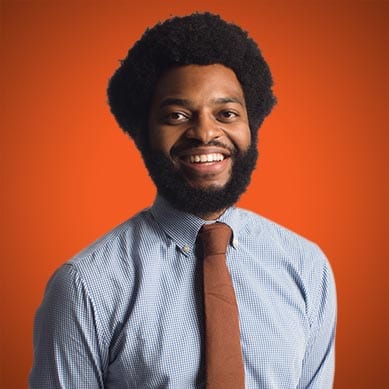Jovan Julien is a PhD student in operations research at the H. Milton Stewart School of Industrial and Systems Engineering at Georgia Institute of Technology. They are a part of Health Policy Research Scholars Cohort 2017.
Before we begin, tell us a little bit about yourself and what your research interests are.
I am a child of the Caribbean, so I am a child of many things including revolutionary love and Bwa Kayiman. Born in New Jersey, I was raised in a community of caring Haitians who made sure that I knew both the beauty and the challenges of the past 200 years of my ancestral story. My grandmother’s name was Meliana Julien.
Generally, my research focuses on how to make decisions under uncertainty. I am interested in how individuals and communities can make complex interdependent choices in ways that preserve or expand the potential for us to live in a just world.
What’s the story behind why you’re doing what you’re doing?
My education and career have situated me in both the most and the least resourced schools and communities, and I’m grateful for the training I received in organizing and the Black Radical Traditions in the South (of the United States). I do what I do because I believe individuals and communities should be supported in making decisions rather than having all their choices made for them. I am interested, therefore, in using and creating mathematical tools and techniques to support folk in making shared choices rooted in a clear understanding of individual impact and responsibility.
Tell us about a project you are currently working on that you are excited about.
The common thread through much of my work and life has been how to make decisions in settings where there is no one perfect choice. Currently, I am excited to be working on a project whose aim is both understanding how alcohol affects liver cirrhosis mortality in the United States, and creating a tool that would aid drinkers in picking levels and patterns of drinking that minimize their potential to die from liver disease. The research has the potential to free hundreds of millions of dollars a year—currently spent to treat end-stage liver disease and to conduct alcohol-related liver transplants—for other uses.
For people unfamiliar with your research area, what is one piece of information you think is important for them to know?
The choices we make today will have consequences, good and bad, in the future. Over the past 50 years, a number of tools have been developed to help quantify, understand, and optimize the decisions we make under uncertainty. That being said, understanding how those decisions impact individuals and communities on the margins is just as essential as understanding policy impacts on the overall society.
Who is a researcher you admire and why?
Can I name two? Walter Rodney and David Blackwell.
Walter Rodney’s legacy of pivotal work both in the academic and political realms is to me a critical example of how scholarship with heart can effect change in the world.
David Blackwell, noted mathematician and scholar, is inspiring because of the way his work sits at the root of so much of modern operations research and decision-making science today. His following quote helps to center and focus my work each day: “I’ve worked in so many areas—I’m sort of a dilettante. Basically I’m not interested in doing research and never have been. … I’m interested in understanding, which is quite a different thing. And often to understand something you have to work it out yourself because no one else has done it.”
How has being an HPRS Scholar helped you during your time as a doctoral candidate?
The truth is that being an HPRS Scholar has been critical in nearly every facet of my success as a doctoral student. That being said, the most critical way it has helped has been the community it has provided. The other scholars in my cohort and the many scholars I’ve had the pleasure of meeting from the other cohorts continue to inspire hope in me each and every day. They make the good days better and the bad days bearable.
In the RWJF HPRS program, we have worked with you to help you think further about using your research to develop policy. If you could use your research to change any policy, what policy would it be?
If I could use my research to change any policy, I would intercede to change the Sober Truth on Preventing (STOP) Underage Drinking Act and similar legislation that focuses solely on prevention and reduction of alcohol use among youth ages 12 to 20. I hope my research elucidates how accurate, honest, and compassionate drug education can empower youth in a world where psychoactive substances are widely available in both medical and nonmedical settings.
OK, here’s a fun question to wrap things up. If you could visit any place in the world, where would you choose to go and why?
If I could visit any place in the world, today I would choose the Citadelle in Haiti. I would go to be reminded of the lengths to which humans will go to ensure their dignity is respected.
Thank you so much for your time!

